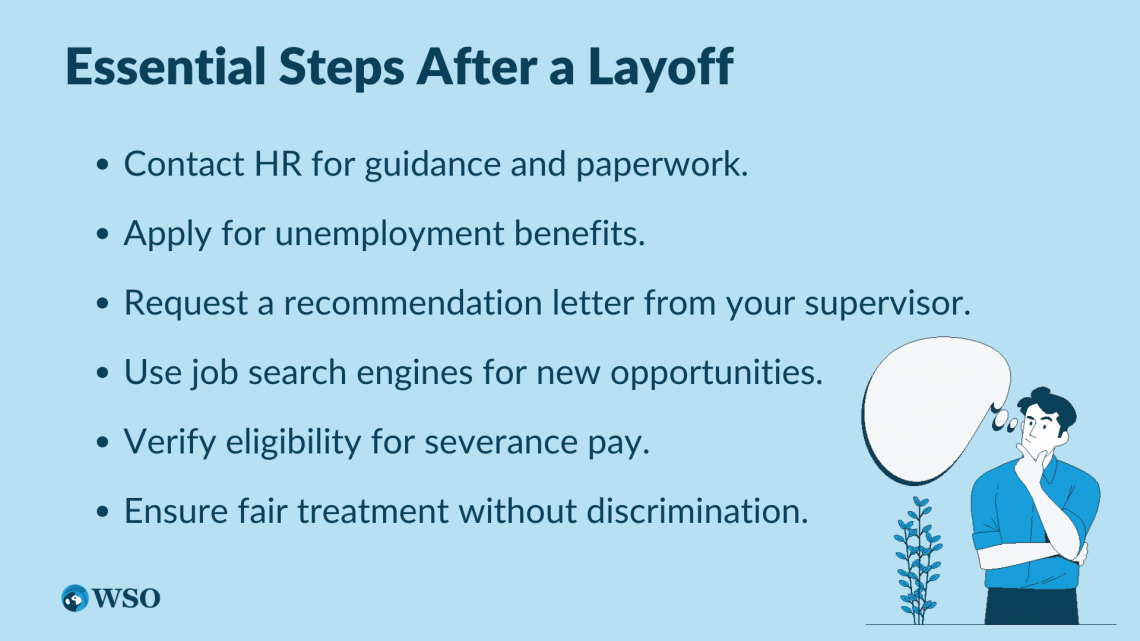Laid Off
Temporary suspension or permanent termination
What Is A Layoff?
Layoffs can be both temporary and permanent. Layoff means temporary suspension or permanent termination of an employee or group of employees due to the business downsizing or other business reasons.

If someone got laid off, it means that the person in question had to leave the company due to some company reasons or policies, or simply because of urgent cost cutting.
There is a difference between getting fired and being laid off. Being fired means the company fired someone due to their actions such as:
- Poor job performance
- Violations of company standards
- Misconduct or other reasons
Being laid off means someone possibly didn’t do anything wrong but lost the job due to company policies or cost cutting. The company deciding to downsize a certain department and minimizing costs could be an example of a layoff. In fact, it was a very common scenario during the pandemic.

During COVID 19, a lot of people lost their jobs as the company decided to downsize it due to cost saving. A lot of companies went out of business and the majority of stores went online, which created huge unemployment.
Anyone can get dismissed even if they are giving the best effort in the job. We need to get prepared for that and need to know what steps can be taken after losing the job. If we lose our jobs, it is necessary to keep a positive attitude and not give up on employment.
Key Takeaways
- Layoffs can be both temporary and permanent, and they occur due to business downsizing or other cost-cutting reasons.
- Getting laid off is different from getting fired; being laid off is not due to any fault of the employee but rather company policies or economic circumstances.
- If you have been laid off, talk to HR about the necessary steps, file for unemployment, and seek a letter of recommendation from your supervisor.
- Consider looking for part-time or freelancing jobs while searching for a new job, update your resume and LinkedIn profile, and take advantage of free online courses to enhance your skills during this time.
- Reasons for layoffs include recession, overlapping job duties, mergers, cost-cutting, and company restructuring. Employees may be provided with severance pay and references to support their transition to new opportunities.
What To Do if You Have Been Laid Off
If you get laid off, the first thing you should do is to talk to the HR and ask what the necessary steps can be taken regarding the matter. You need to make sure that the necessary paperwork like exit papers have been made. You can even file for unemployment in your state too.

The next thing to look for would be to see if your supervisor will write you a letter of recommendation so that you can look for your new job without facing any obstacle.
Employees nowadays use job search engines to look for appropriate candidates, so it could be a good idea to look for new jobs on those search engines.
In this case, it will decrease a lot of hassles and you may even find your desired job on those platforms. If you have been laid off, you may be eligible to get severance pay. The HR department needs to take care of the severance pay and the final paycheck.
Employers need to be fair in this matter and can't discriminate among employees.
Severance pay may affect future employment. Let’s say the employer granted the payment of severance equivalent to two months' salary: the employee who got dismissed can't join the new workplace until next two months. Therefore, before taking any decision, discuss with HR.

You need to read your contract thoroughly if you have signed a contract and see if there is something mentioned about the continuation of the employment. In this case, if you would be dismissed for reasons not stated in your contract, this would be considered a breach of your contract.
If you belong to any union, you may get additional rights so for that reason talk to your union. Unions and committees of labor associations can help any labor regarding this situation if someone is facing any problem.
Unfortunately, being laid off is not easy, and most people dealing with this kind of situation might find it hard to remain positive.
However, it is important to remain hopeful, so get your resumes, cover letters and LinkedIn profiles updated and take the advantage of any free online courses that may brush up your skills.
What To Do After Getting Laid Off?
After getting laid off, the first thing one should do is estimate how much money is needed to support the family for a while. Coming up with a budget plan is also recommended so your savings can be used appropriately.

There are also several things you can do:
-
Looking for a part-time or freelancing job is a good idea to sustain for a while and search for a new job at the same time.
-
Networking, and asking friends and family for help is a good move. Keeping the resume and LinkedIn profiles updated is the best idea.
-
Attending workshops and seminars is another thing that can be done during this time.
-
Utilizing and taking most of this time is the best thing anyone can do. So, keep in mind that it will help you to get ready for your next challenge, and you will get to learn new things or nurture your previous skills.
-
You can even start your academic studies if you haven’t been able to complete it or can start a new degree as well, such as Masters or PhD degrees.
Before taking any course, make sure you have made a proper plan on how you will follow up on these after getting the new job.
Why Does Layoff Occur?
Layoffs are very common in the modern job market. There is nothing to feel intimidated about. There are several reasons behind the occurrence of layoffs.

Some of those have been discussed below:
-
Recession is one of the most common causes of layoffs. Especially during the pandemic, the company loses money and due to that reason, they decide to cut off losses and they downsize the company by layoffs.
-
If several employees are doing the same tasks and duties, then the company will lay off the extra employees. They layoff those employees who are not contributing much to the business.
-
Mergers and acquisitions are another reason. When two companies merge and the duties and responsibilities of their employees overlap, then some of the employees get laid off.
-
When a company decides to cut the costs, they end up downsizing the company by layoffs.
-
If the company decides to restructure it and the new structure doesn’t require much employees, then they lay off the extra employees.
-
If the company has decided to get out of the business or go online fully, they let the employees go and look for other jobs.
A company doesn’t let the employees go empty handed, but they provide whatever they possibly can. If not, they provide the employees with good references so that they can start a good career in a new company.
Researched and authored by Mehnaz Tarannum | LinkedIn
Free Resources
To continue learning and advancing your career, check out these additional helpful WSO resources:




or Want to Sign up with your social account?